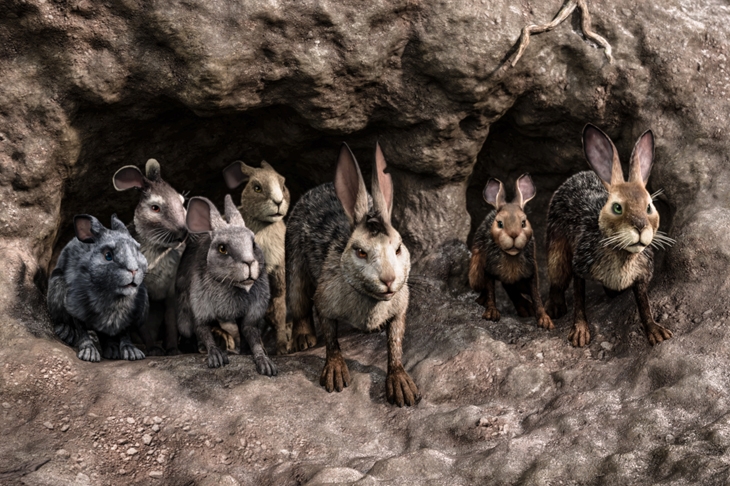For a while, as a 13-year-old, I was obsessed with rabbits — the consequence of having read Watership Down by Richard Adams. I tried to share my enthusiasm for the book with my parents, but my father told me that he thought the scenario depicted by Adams was ‘improbable’. However, they did consent to take me to that indeterminate, shifting area where the novel is set, with its back legs in Berkshire and its front paws in the last remaining unspoilt quadrant of Hampshire.
We were on the way home from a holiday at some grim Methodist guest house in the West Country and were undoubtedly tired from the drive. But still they followed me around with my map and tried to look excited when I suddenly proclaimed: ‘Look, that’s the combe where Bigwig met the fox!’ And a little further along: ‘I wonder if that’s the site of the Efrafa Warren!’ It was very kind of them to indulge me in this. A year later I was similarly obsessed by Jack Kerouac, but somehow they never got around to taking me to Big Sur.
I’ve just watched the four-part animated series of Watership Down, shown on the BBC, with my daughter. She was slightly more aghast than me to discover that the aforementioned Bigwig was a bruv from the ’hood. And still more repelled by the elevation of a minor female rabbit character into a doughty campaigner for justice, the transgendering of a rabbit called Strawberry, and, most hilariously, the does calling each other ‘sister’ and keening a song of freedom in an orgy of #MeToo victimhood — their importance to the book she too had loved vastly exaggerated for fatuous political reasons.
None of this surprised me terribly, as I have become accustomed to the liberal, white, middle-class BBC bosses shoe-horning their absurd social justice twattery into every single drama production they commission. It had been evident a week or two earlier with their dramatisation of Agatha Christie’s The ABC Murders, which was rightly panned even by journos who get much less worked up by this sort of thing than I do. My daughter, meanwhile, is very rapidly coming to the same conclusion as me, having junked Doctor Who for its inane PC gibberish a while ago and terrified they might soon introduce a transitioning Dalek or a woke cyberman.
The BBC’s obsession is all-consuming, bizarre and, I would hazard, counter to the wishes of that great unwashed rump of people beyond London, i.e. the licence-payers. I have the feeling that people quite liked The Archers when it was about heterosexual white folk living somewhere in Warwickshire and less so when it was invaded by sexual deviants and Bulgarians.
And it’s not just the BBC. The mindset was at its most absurd and twisted in an ITV drama series shown just over a year ago, Liar. This seemed, at first, a promising confection. There was an allegation of rape and viewers were invited to workout who was telling the truth, the woman or the man. But it very soon became evident that there would be no dispute whatsoever: the man did it, and that’s that. Critics pointed out that, of course, it would be irresponsible to suggest that the woman had lied. Despite the fact that some women do lie in such circumstances. For reasons of political correctness, all the drama and uncertainty were excised.
There is something distinctly Soviet in this inability to cast one’s imagination beyond a set of idiotic shibboleths to present a denouement which might not accord with the sensibilities of the ruling elite. Indeed it is the kind of mindset which writers such as Vladimir Voinovich once satirised.
Still, it seems to me even more egregious when the BBC trawls through the annals of popular historical fiction, of novels from more than 30 years ago, and ramrods into them its bien pensant obsessions. I would have been much less offended if the BBC had commissioned a writer to confect a story about a group of incredibly woke SJW rabbits, led consensually by a female called perhaps ‘Roz’, who not only liberate a fascistic warren but also open up their own warren to thousands of Iranian rabbit refugees who turn out to be kindly and agreeable and work together with the host population to combat global warming and eradicate poverty.
Nobody would watch such arrant crap, of course, but it would at least be true to itself. But this isn’t done for precisely the reason to which I alluded: nobody would watch it. Instead, the BBC piggybacks on the enormous success and popularity of novels such as Watership Down and warps them until they are unrecognisable. But there are good reasons why Richard Adams and Agatha Christie are popular and one of them is that they were not noticeably afflicted by a kind of psychosis that forced them to have their characters conform to the straitjacket of liberal ideology. Their imaginations exceeded such a crude template. That’s why people enjoyed reading their books.
But for the liberals in general, and the BBC in particular, history is not something which happened some time ago. Instead it is something which must be controlled from the eternal tyranny of Now. Now is right, everything else is wrong and therefore they feel no compunction in twisting history to suit their own purposes. It is the same mindset that demands the removal of statues of white British imperialists from university campuses, and university English courses that ask of students: why is my reading list so white?
I suppose the only thing to do is join Charles Moore in refusing to pay my licence fee, because the BBC isn’t going to change any time soon. That may just be my New Year’s Resolution.







Comments